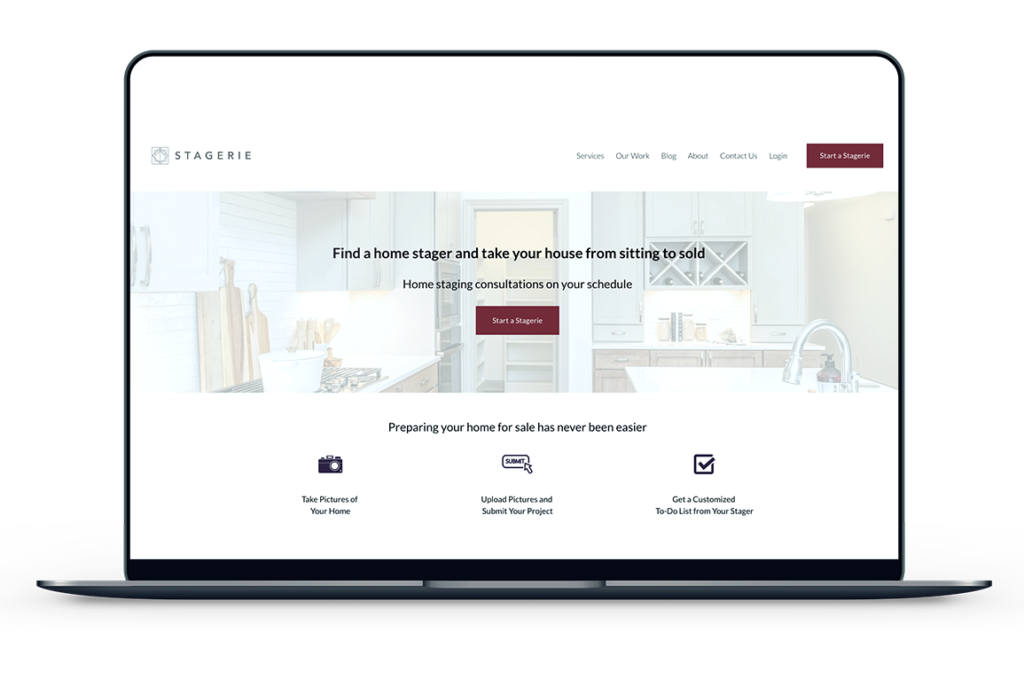
Nora Crosthwaite
Nora Crosthwaite spent years in the software development world and exited to do something meaningful and positively impact the people around her. With no sales, marketing, or real estate experience, she became a residential REALTOR® in Des Moines, Iowa, helping people get to the right house for their story.
After working in real estate for some time, Nora realized there was a need for assisting sellers to prepare their homes for sale. Nora searched for convenient online staging services and couldn’t find the right fit. So, she created one: Stagerie.
Can you give us an overview of your career and how it’s evolved?
My career keeps evolving. My background is in computer science and I hold a bachelor’s in computer science and an MBA. I spent 17 years in software dev consulting roles, different software. I started as a Y2K tester and worked my way up to being a program director for large-scale implementations, specifically in warehousing manufacturing, software packages, and order management software packages.
What drove you to transition from coding to real estate?
It was a kind of back and forth, but always in the software realm. And then I got bored, and I quit on a whim with no clue what I wanted to be when I grew up.
My parents are both computer science PhDs. My dad taught at the University of Texas for 40 years. My mom was at IBM for over 20 along with her other roles. And she was the first female senior technical staff member, which was essentially a technical track director position in their IBM Austin Campus, which was huge. My mom passed away before I quit IT. During one of the last conversations she had with me, she said, “Nora, you’re going to kill yourself. You are working really hard. You’re here in the hospital with me, and you’re managing your projects, and you’re managing your household, and you’re traveling all the time. You’re going to kill yourself. What are you doing?”
And I said, “I’m following you, mom. I’m doing what you’re doing.” She said, “Don’t do what I did, because just don’t do it.” When I quit my job, I was in between projects, and my boss said, “Hey, it’s time for us to find you a new project.” And I said, “Don’t bother. I think I’m done.” The words just popped out.
I spent six months trying to figure out what I wanted to be when I grew up. I was in my late thirties. I had never done anything but tech. And on a whim decided to become a residential realtor.
What is Stagerie, and how is it helping others?
I head up a residential team with RE/MAX Precision. About three years ago, I noticed my sellers ask me things like, “Hey, what do I need to do to prepare my house for sale? or “So what color should I paint?” And I’d say, “I don’t know. I know it’s wrong. I know this is not it, but I don’t know how to get you to it.”
I started looking for a service where I could take pictures of my client’s houses, upload them, and get a staging console. And it didn’t exist. I started thinking about creating an online marketplace connecting realtors and homeowners with expert stagers and making that process easy, so every house gets staged. And that’s where I’m at as the founder of Stagerie.
Can you tell us about some of the initiatives and community organizations you’re involved in?
FemCity was an organization that, for a long time, I focused on. FemCity is a networking organization for entrepreneurial-minded women. I was also an ambassador of the board.
Outside of FemCity, I’ve practiced martial arts for over 20 years. I taught at Farrell’s for almost a decade teaching martial arts and Taekwondo to kids and adults.
I actively volunteer with Greater Des Moines Habitat For Humanity. I organize a women’s build every year. And part of my real estate commissions from every sale goes to Habitat. I am also starting a non-profit called The Kia Foundation to cover scholarships for martial arts training for underserved youth.
My passion from a state standpoint is Pi515. I got to work with them during the Greater Des Moines Leadership Institute community leadership program in 2020. I pledge that as Stagerie grows, five percent of profits will be donated to Pi515. This is the next generation, and it’s time. And through my years of software development, I became used to being the only woman in the room, especially the only person of Middle Eastern descent in the room.
Throughout all your experiences, what are some tried and true principles that you feel are translatable to all those companies and industries and organizations you’ve been involved in?
I would say balance, directness, and empathy. When you’re working on these high-pressure software jobs that are 70 hour weeks for six to 12 months at a time, and your team is distributed across borders, we all get frustrated. Pick up the phone, and call them, have a Zoom one-on-one, and talk it out. Don’t let those things fester.
Always surround yourself with people that are doing better because just by watching, you learn. And sometimes, as a leader or as a manager, people feel like they know it all. I know I’ve been guilty of that. You have to seek out other opinions and seek out learning opportunities.
I don’t think the golden rule, treat others how you would want to be treated, goes far enough. Treat others how they want to be treated. Imposter syndrome is a real issue. I am not fond of the term “fake it till you make it.” I think that the better way to say it is, “be who you are, so that doing what you do will help you succeed.”
How do you encourage innovation and idea-sharing in our community?
I have an open-door policy. If business owners have an idea or a professional is passionate about an idea, let’s talk about it. I see my role as a breadcrumb along the way to success.

I want to see more people get into tech and grow. We can all be successful.
What was your passion growing up, and what did you envision for your career? Especially with two parents so heavily involved in tech.
It was always “eat, breathe, sleep: math and science.” As a child, my dream was to go to MIT and be a doctor someday. But it wasn’t really serious. Then, I started in college as an engineering student and hated it. So I switched into computer science purely because it was the only degree I could get before my scholarship money ran out. I think that my goal growing up was to meet my parents’ very high expectations.
I didn’t feel passion until midway through my career when I was working on warehousing software, and one of the warehouse workers came up to me and said, “Thank you so much. Because of the software, we’re not going to have to work all this overtime. And it looks like I might get the weekend off.” And that was it. It’s an impact. And ever since then, I’ve been chasing that high.
Tell us about any mentors you may have had or still have that influence your career.
Several mentors are Erin Rollenhagen with Entrepreneurial Technologies, inspirational speaker Mo Collins, Alex Taylor with NewBoCo., Nancy Mwirotsi with Pi515, and Jen Stanbrough, a fellow Des Moines area realtor. Many of these people would be surprised to know what an impact they make daily in my life.
What advice would you give a young person considering a tech career path or aspiring to be in a tech leadership role?
Regarding a young person, I would say know how to solve problems and don’t discount liberal arts because those backgrounds teach you how to think. My husband has a degree in philosophy and liberal studies, and he is a risk and compliance officer for Corteva Agriscience in IT security; and I have never won an argument in the last 21 years. You have to make it an art and go through periods where you’re the tech consumes you. I also believe many people early on in their tech careers; myself included, tend to feel arrogant about their tech skills. So don’t do that. And lastly, for a young person in tech, I’d say find your passion, then figure out how it’s going to pay because it’s miserable otherwise.
In regards to tech leadership, you have to love solving problems and making things work better. Sometimes my best coding breakthroughs came at 2:00 a.m., which was very rewarding. However, being the best coder may not be the best tech leader. Just because you can code fast, and it’s great, and there are no bugs, and the code works well, and it performs well does not make you a good tech leader. Being a good tech leader means treating people how they need to be treated.
Whether you’re a young person or a leader, don’t stop fighting for what you’re striving for. There are many bumps in the road, and if the bump is high, go around it.
Why is it important to have people of different backgrounds in technology?
If you don’t have people of different backgrounds in technology, you have an echo chamber of people like me with years of experience in tech with stale ideas. Different experiences lead to different solutions. And we have some significant issues in Des Moines, in Iowa, and in the world that are not going to get solved with one or two brilliant people. So I think it’s better for all of us.
As you look to the future, how would you like to see talent development and workforce grow in Iowa?
I’d like to see less emphasis on a four-year college degree as an entry point into a tech career. We need to expand openings for mentorship programs. We need to have openings for people who have coded on their own and just need a little bit of apprenticeship to take their code from homegrown to something that could be valuable in a corporate environment.
It’s not just young adults coming out of high school. It could also be adults who want to make a change or people who have served time (for a non-violent offense) and have paid their debt. We have to do better there.
I would also really like to stop seeing “tech versus the trades.” For example, electricians are technical, but we don’t have enough of them. Why not merge those fields so that people feel like they have both tech and trade expertise?
We simply do not have enough tech workers in Iowa. I've heard it from quite a few people who are trying to hire in that space. However, we have people that can learn, and we need to invest in those people.


